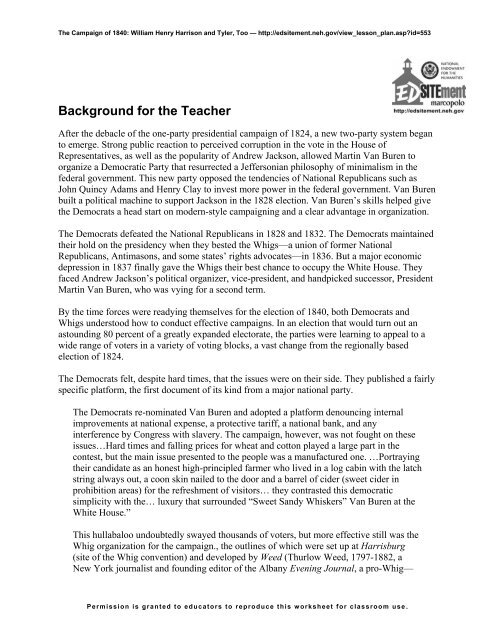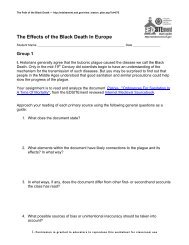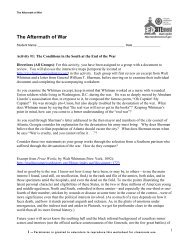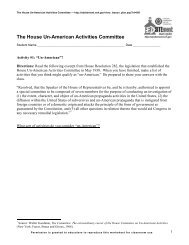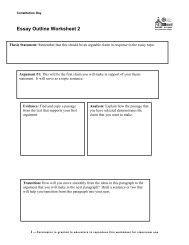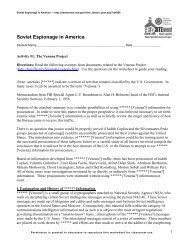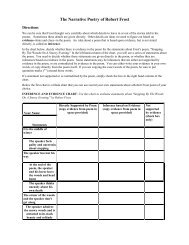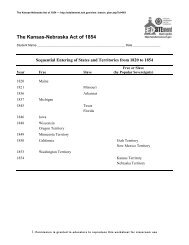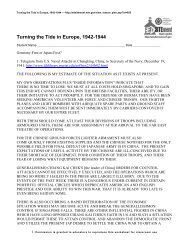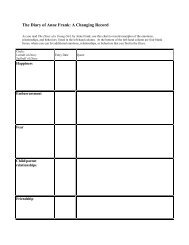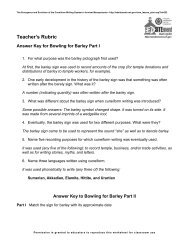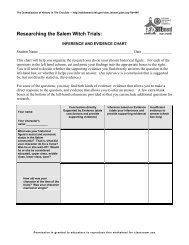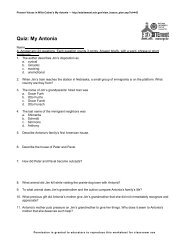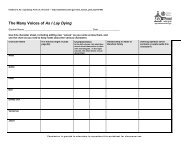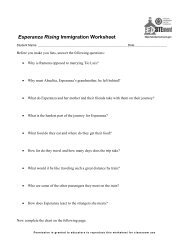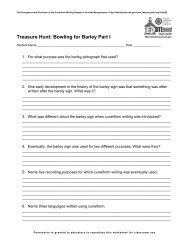Master PDF - EDSITEment
Master PDF - EDSITEment
Master PDF - EDSITEment
Create successful ePaper yourself
Turn your PDF publications into a flip-book with our unique Google optimized e-Paper software.
The Campaign of 1840: William Henry Harrison and Tyler, Too — http://edsitement.neh.gov/view_lesson_plan.asp?id=553<br />
Background for the Teacher<br />
After the debacle of the one-party presidential campaign of 1824, a new two-party system began<br />
to emerge. Strong public reaction to perceived corruption in the vote in the House of<br />
Representatives, as well as the popularity of Andrew Jackson, allowed Martin Van Buren to<br />
organize a Democratic Party that resurrected a Jeffersonian philosophy of minimalism in the<br />
federal government. This new party opposed the tendencies of National Republicans such as<br />
John Quincy Adams and Henry Clay to invest more power in the federal government. Van Buren<br />
built a political machine to support Jackson in the 1828 election. Van Buren’s skills helped give<br />
the Democrats a head start on modern-style campaigning and a clear advantage in organization.<br />
The Democrats defeated the National Republicans in 1828 and 1832. The Democrats maintained<br />
their hold on the presidency when they bested the Whigs—a union of former National<br />
Republicans, Antimasons, and some states’ rights advocates—in 1836. But a major economic<br />
depression in 1837 finally gave the Whigs their best chance to occupy the White House. They<br />
faced Andrew Jackson’s political organizer, vice-president, and handpicked successor, President<br />
Martin Van Buren, who was vying for a second term.<br />
By the time forces were readying themselves for the election of 1840, both Democrats and<br />
Whigs understood how to conduct effective campaigns. In an election that would turn out an<br />
astounding 80 percent of a greatly expanded electorate, the parties were learning to appeal to a<br />
wide range of voters in a variety of voting blocks, a vast change from the regionally based<br />
election of 1824.<br />
The Democrats felt, despite hard times, that the issues were on their side. They published a fairly<br />
specific platform, the first document of its kind from a major national party.<br />
The Democrats re-nominated Van Buren and adopted a platform denouncing internal<br />
improvements at national expense, a protective tariff, a national bank, and any<br />
interference by Congress with slavery. The campaign, however, was not fought on these<br />
issues…Hard times and falling prices for wheat and cotton played a large part in the<br />
contest, but the main issue presented to the people was a manufactured one. …Portraying<br />
their candidate as an honest high-principled farmer who lived in a log cabin with the latch<br />
string always out, a coon skin nailed to the door and a barrel of cider (sweet cider in<br />
prohibition areas) for the refreshment of visitors… they contrasted this democratic<br />
simplicity with the… luxury that surrounded “Sweet Sandy Whiskers” Van Buren at the<br />
White House.”<br />
This hullabaloo undoubtedly swayed thousands of voters, but more effective still was the<br />
Whig organization for the campaign., the outlines of which were set up at Harrisburg<br />
(site of the Whig convention) and developed by Weed (Thurlow Weed, 1797-1882, a<br />
New York journalist and founding editor of the Albany Evening Journal, a pro-Whig—<br />
Permission is granted to educators to reproduce this worksheet for classroom use.
The Campaign of 1840: William Henry Harrison and Tyler, Too — http://edsitement.neh.gov/view_lesson_plan.asp?id=553<br />
and later, pro-Republican—newspaper, who worked behind the scenes as a political<br />
operative) and other party leaders… A Whig committee composed of members of<br />
Congress and with headquarters in Washington used congressional franks (the privilege<br />
of members of Congress to mail items free of charge) to distribute speeches, handbills,<br />
and a pamphlet entitled “The Contest” which told the voters they had to choose between<br />
“Harrison and Prosperity or Van Buren and Ruin.” There were Whig state committees<br />
and county committees and a personal campaign committee to advise Harrison and<br />
handle his correspondence. And there were numerous ratification meetings, Tippecanoe<br />
clubs, Victory Ball marches and many campaign papers (most notably Horace Greeley’s<br />
Log Cabin. At the height of the campaign, Greeley printed as many as 80,000 copies of<br />
the Log Cabin.).<br />
-- From Glyndon G. Van Deusen (“The Whig Party,” History of U.S. Political Parties,<br />
Volume 1. Arthur M. Schlesinger, Jr., Ed. 4 vols. New York: Chelsea House Publishers,<br />
1973. 343-344.)<br />
The Whigs did not publish a platform—not surprisingly, as the practice was not yet an obligatory<br />
part of the nominating process. In fact, the Democratic platform was the first of its kind from a<br />
major party. But Van Deusen ascribes a different reason to the lack of a platform (“The Whig<br />
Party,” History of U.S. Political Parties, Volume 1. Ed. Arthur M. Schlesinger, Jr. editor. 4 vols.<br />
New York: Chelsea House Publishers, 1973. 343):<br />
With an eye to the… need for stressing different aims in different sections of the country,<br />
the convention agreed that it would be better not to have a platform and none was drafted.<br />
Whatever the reason, no statement about positions came out of the nominating process. Whether<br />
or not issues were important to the campaign is a question on which students can reflect as they<br />
analyze campaign documents. Whether issue or image, the campaign combined traditional<br />
organizing with much that was new or on a much grander scale.<br />
The Democrats undertook a campaign in what had become a traditional style. They<br />
depended on organization, full use of their patronage platoons and a conventional<br />
propaganda barrage. They deplored the “demagoguery” of the Whigs and tried to deal<br />
with issues, although they also heaped abuse on Harrison. The total effect was rather staid<br />
and prosaic.<br />
The Whigs, on the other hand, elaborated their new-style campaign and made it as<br />
diverting as it was professional. They used organization to draw huge crowds… Whig<br />
propaganda included a panoply of visual devices like Harrison “Liberty Poles” as well as<br />
mottoes, songs, jokes, along with “efficient orators.” …It was all drama and popular<br />
commotion mixed with slander and smears designed to destroy “Martin Van Ruin.” It<br />
was a combination of merchandizing and militia styles, with all the stops pulled out (669-<br />
670).<br />
William Henry Harrison spoke in public—unprecedented for a candidate for president. In at least<br />
one speech, he even addressed the accusation that he (and his party) took no stand on the issues.<br />
He vehemently denied this in a speech in Dayton on September 10, 1840:<br />
Permission is granted to educators to reproduce this worksheet for classroom use.
The Campaign of 1840: William Henry Harrison and Tyler, Too — http://edsitement.neh.gov/view_lesson_plan.asp?id=553<br />
…I am fully aware, my fellow citizens, that you expect from me some opinion upon the<br />
various questions which now agitate our country, from centre to circumference, with such<br />
fierce contention. Calumny, ever seeking to destroy all that is good in this world, hath<br />
proclaimed that I am averse from declaring my opinions on matters so interesting to you;<br />
but nothing can be more false.<br />
Have I not, time out of mind, proclaimed my opposition to a citizen’s going forward<br />
among the people and soliciting votes for the Presidency? Have I not, many a time and<br />
often, said, that in my opinion, no man ought to aspire to the Presidency of these United<br />
States, unless he is designated as a candidate for that high office by the unbought wishes<br />
of the people? If the candidate for so high an office be designated by a portion or a<br />
majority of the people. They will have come to the determination of sustaining such a<br />
man from a review of his past actions and life, and they will not exact pledges from him<br />
of what he will do and what he will not do, for their selection of him is proof enough that<br />
he will carry out the doctrines of his party, This plan of choosing a candidate for the<br />
Presidency is a much surer bar against corruption than the system of requiring promises.<br />
If the pledging plan is pursued, the effect will be, to offer the Presidential chair to the<br />
man who will make the most promises. He who would pledge the most, he who would<br />
promise most, would be the man to be voted for, and I have no hesitation in declaring my<br />
belief, that he who would subject his course to be thus tied up by promises and pledges,<br />
would not stop to break them when once in office…<br />
While then, fellow citizens, I have never hesitated to declare my opinions on proper<br />
occasions upon the great questions before the nation, I cannot consent to make mere<br />
promises the condition of obtaining the office which you kindly wish to bestow upon me.<br />
My opinions I am free to express, but you already have them, sustained and supported by<br />
the acts of a long and arduous life. That life is a pledge of my future course, if I am<br />
elevated by your suffrages to the highest office in your gift (737-738).<br />
Your students can look at an annotated version of this excerpt to evaluate Harrison’s defense.<br />
How else was the campaign that followed conducted? According to William Nisbet Chambers<br />
(“Election of 1840,” History of American Presidential Elections, Volume 1. Arthur M.<br />
Schlesinger, Jr., Ed. 5 vols. New York: Chelsea House Publishers, 1971.):<br />
…the Harrison campaign plan of 1840 exhibits important parallels with certain modern,<br />
highly professional campaigns… The Whig managers of 1840 were the new<br />
professionals of their party, and they made resourceful use of the proliferating mass<br />
media of the time. In the process, they created a political persona for William Henry<br />
Harrison that had little to do with actuality. They called it “Old Tip,” surrounded it with<br />
various trappings such as log cabins and cider barrels, offered it as packaged charisma, as<br />
the representative and savior of the common man, and sold it to the masses (644).<br />
…“Old Hickory” was an authentic Military hero. …By contrast, Harrison was a minor<br />
military figure and a folk hero only as the result of the Whig campaign imagery…<br />
Permission is granted to educators to reproduce this worksheet for classroom use.
The Campaign of 1840: William Henry Harrison and Tyler, Too — http://edsitement.neh.gov/view_lesson_plan.asp?id=553<br />
One extension to this unit allows students to look at some primary sources to decide for<br />
themselves if Harrison was or was not a genuine hero.<br />
The Whig publicists also successfully created a marvelously ingenious negative image of Martin<br />
Van Buren (644). If Van Buren were so easily tarnished, why did the Democrats nominate him?<br />
…There was no doubt that the Democrats would nominate Martin Van Buren again.<br />
Fifty-eight in 1840, nearly twenty years younger than Harrison, he had served his party<br />
well. He had also labored to maintain his position among the various blocs that<br />
constituted the party, and he could count on a national cadre of patronage officeholders.<br />
Short, round, and a bit dapper with his reddish side-whiskers, he was genial and urbane, a<br />
shrewd political manager who had been called the “Red Fox” and the “Little Magician.”<br />
Yet he lacked flair, drama, the touch of charisma that makes for a strong popular image.<br />
It was all very well to dub him “Old Kinderhook,” but his political persona was less than<br />
“O.K.” for the times. In the face of depression and privation, the Whigs were nearer to<br />
the mark when they declared that “Matty Van” was a “used-up man” (Chambers, 666).<br />
The contest between Martin Van Buren and William Henry Harrison marked the first truly<br />
modern presidential campaign, with methods today’s students are sure to recognize. Lessons in<br />
this unit allow students to become familiar with the issues and personalities and to review an<br />
assortment of primary documents. As students analyze them, they reflect on the presidential<br />
campaign of 1840. How was it conducted? What was the role of campaign advertising? How<br />
crucial were issues to the election of William Henry Harrison? How crucial was image?<br />
Permission is granted to educators to reproduce this worksheet for classroom use.
The Campaign of 1840: William Henry Harrison and Tyler, Too — http://edsitement.neh.gov/view_lesson_plan.asp?id=553<br />
Democrats and Whigs, Side by Side<br />
NOTE: Information for some categories may not be found in the Abraham Lincoln Historical<br />
Digitization Project essays and can be left blank.<br />
Democrats<br />
Whigs<br />
Origin/History<br />
Party Leaders<br />
Regions of Country<br />
Strongly Supporting<br />
Position on:<br />
American System<br />
(Internal Improvements)<br />
Federal Land Policy<br />
Indian Affairs<br />
National Bank<br />
Paper Money<br />
Slavery<br />
Tariffs<br />
Territorial Expansion<br />
Permission is granted to educators to reproduce this worksheet for classroom use.
The Campaign of 1840: William Henry Harrison and Tyler, Too — http://edsitement.neh.gov/view_lesson_plan.asp?id=553<br />
Democratic Platform of 1840<br />
1. Resolved, That the federal government is one of limited powers, derived solely from the<br />
constitution, and the grants of power shown therein, ought to be strictly construed (interpreted) by<br />
all the departments and agents of the government, and that it is inexpedient (not advantageous) and<br />
dangerous to exercise doubtful constitutional powers.<br />
2. Resolved, That the constitution does not confer upon the general government the power to<br />
commence and carry on, a general system of internal improvements.<br />
3. Resolved, That the constitution does not confer authority upon the federal government, directly<br />
or indirectly, to assume the debts of the several states, contracted for local internal improvements,<br />
or other state purposes; nor would such assumption be just or expedient (advantageous).<br />
4. Resolved, That justice and sound policy forbid the federal government to foster one branch of<br />
industry to the detriment of another, or to cherish the interests of one portion to the injury of<br />
another portion of our common country – that every citizen and every section of the country, has a<br />
right to demand and insist upon an equality of rights and privileges, and to complete and ample<br />
protection of person and property from domestic violence, or foreign aggression.<br />
5. Resolved, That it is the duty of every branch of the government, to enforce and practice the most<br />
rigid economy, in conducting our public affairs, and that no more revenue ought to be raised, than is<br />
required to defray the necessary expenses of the government.<br />
6. Resolved, That congress has no power to charter a national bank; that we believe such an<br />
institution one of deadly hostility to the best interests of the country, dangerous to our republican<br />
institutions and the liberties of the people, and calculated to place the business of the country within<br />
the control of a concentrated money power, and above the laws and the will of the people.<br />
7. Resolved, That congress has no power, under the constitution, to interfere with or control the<br />
domestic institutions of the several states, and that such states are the sole and proper judges of<br />
everything appertaining (relating) to their own affairs, not prohibited by the constitution; that all<br />
efforts by abolitionists or others, made to induce congress to interfere with questions of slavery, or<br />
to take incipient (beginning) steps in relation thereto, are calculated to lead to the most alarming<br />
and dangerous consequences, and that all such efforts have an inevitable tendency to diminish the<br />
happiness of the people, and endanger the stability and permanency of the union, and ought not to<br />
be countenanced by any friend to our political institutions.<br />
8. Resolved, That the separation of the moneys of the government from banking institutions, is<br />
indispensable for the safety of the funds of the government, and the rights of the people.<br />
Permission is granted to educators to reproduce this worksheet for classroom use.
The Campaign of 1840: William Henry Harrison and Tyler, Too — http://edsitement.neh.gov/view_lesson_plan.asp?id=553<br />
9. Resolved, That the liberal principles embodied by Jefferson in the Declaration of Independence,<br />
and sanctioned in the constitution, which makes ours the land of liberty, and the asylum of (safe<br />
haven for) the oppressed of every nation, have ever been cardinal principles in the democratic faith;<br />
and every attempt to abridge the present privilege of becoming citizens, and the owners of soil<br />
among us, ought to be resisted with the same spirit which swept the alien and sedition laws from<br />
our statute-book.<br />
Permission is granted to educators to reproduce this worksheet for classroom use.
The Campaign of 1840: William Henry Harrison and Tyler, Too — http://edsitement.neh.gov/view_lesson_plan.asp?id=553<br />
Proceedings of the Whig State Convention<br />
Since no national Whig platform was published, it cannot be said that this regional platform<br />
represented the entire party. However, it does reveal the political positions of the Whigs in one<br />
region. All of the language in the following excerpt is from the original (found on the<br />
<strong>EDSITEment</strong> resource American Memory [http://memory.loc.gov]) except as follows:<br />
• Explanations for words in italics are in parentheses.<br />
• Some punctuation and/or spelling may be standardized.<br />
Worcester, Mass., June 17, 1840<br />
Resolved, That our beloved country calls aloud this day upon her sons, and with a voice hardly<br />
less imploring than that with which she called five and sixty years ago on their Fathers, to rise up<br />
and rescue her from misrule and oppression.<br />
Resolved, That an Elective Despotism (The power of the executive under Jackson and his handpicked<br />
successor Van Buren is portrayed as having grown too great.) is not the Government<br />
which our Fathers fought for; and that unless the tyrannical domination which now overshadows<br />
the liberties of this country be defeated in its desperate efforts to perpetuate its power, the blood<br />
of Bunker Hill will have been shed in vain.<br />
Resolved, That the administration of our National affairs for twelve years past has been one<br />
continued scene of injustice and outrage--that the Constitution has been violated, the most<br />
solemn Treaties trampled on, the Laws disregarded, the public Treasure seized and squandered,<br />
the People's interests overlooked, the people's rights overleaped, and the People's will defied.<br />
Resolved, That the derangement of the currency (referring to the recent depressions and issues<br />
related to the negative Democrat position on paper money and the National Bank), the confusion<br />
of the exchange, the depression of prices, the reduction of wages, the stagnation of trade, and the<br />
general discontent and distress of the People are the legitimate results of bad government,<br />
ruinous measures, and wrong-headed men.<br />
Resolved, That we cannot repress our indignation, when we behold the rulers of the nation,<br />
instead of applying themselves to repairing the mischiefs they have occasioned, engaged in<br />
devising new modes of oppression, and urging forward the adoption of measures by which the<br />
wages of the working man will be reduced still lower, and the bounties of the fishermen<br />
abolished altogether.<br />
Resolved, That there can be no substantial and permanent relief from existing evils, and no sure<br />
and lasting escape from other and even greater evils impending, but in a change of the National<br />
Administration.<br />
Permission is granted to educators to reproduce this worksheet for classroom use.
The Campaign of 1840: William Henry Harrison and Tyler, Too — http://edsitement.neh.gov/view_lesson_plan.asp?id=553<br />
Resolved, That in WM. H. HARRISON of Ohio, we recognize the selected instrument by whom<br />
relief is to be administered to the People--the destined agent of the People themselves, in<br />
restoring the country to the prosperity and purity of its best and brightest days;--that his honesty,<br />
his ability, his bravery, his patriotism, his true hearted democratic republicanism, having stood<br />
the test of more than forty years of service, in peace and in war, can now alike dispense with the<br />
praises of his friends, and defy the slanders of his enemies;--and that we pledge to him our<br />
unanimous support for the presidency.<br />
Resolved, That we have entire confidence in the integrity and capacity of JOHN TYLER of<br />
Virginia, and that we cordially concur with the Harrisburg Convention, in associating his name<br />
with that of Gen. Harrison's, for the two highest offices in the gift of the People.<br />
Permission is granted to educators to reproduce this worksheet for classroom use.
The Campaign of 1840: William Henry Harrison and Tyler, Too — http://edsitement.neh.gov/view_lesson_plan.asp?id=553<br />
Annotated Excerpt from Harrison’s Speech<br />
William Henry Harrison spoke in public—unprecedented for a candidate for president. On at<br />
least one occasion, he addressed the accusation that he (and, by implication, his party) took no<br />
stand on the issues. He vehemently denied this in a speech in Dayton, Ohio, on September 10,<br />
1840 (NOTE: All of the language in the following excerpt is from the original except<br />
explanations for words in italics are in parentheses, and some punctuation and/or spelling may be<br />
standardized.):<br />
…I am fully aware, my fellow citizens, that you expect from me some opinion upon the<br />
various questions which now agitate (stir up strong feelings in) our country, from centre<br />
to circumference (from one end to the other), with such fierce contention (debate).<br />
Calumny (Misrepresentation), ever seeking to destroy all that is good in this world, hath<br />
proclaimed that I am averse from declaring (reluctant to declare) my opinions on matters<br />
so interesting to you; but nothing can be more false.<br />
Have I not, time out of mind, proclaimed my opposition to a citizen’s going forward<br />
among the people and soliciting (seeking) votes for the Presidency? Have I not, many a<br />
time and often, said, that in my opinion, no man ought to aspire to the Presidency of these<br />
United States, unless he is designated as a candidate for that high office by the unbought<br />
wishes of the people? If the candidate for so high an office be designated by a portion or<br />
a majority of the people. They will have come to the determination of sustaining<br />
(supporting) such a man from a review of his past actions and life, and they will not exact<br />
pledges from him of what he will do and what he will not do, for their selection of him is<br />
proof enough that he will carry out the doctrines of his party. This plan of choosing a<br />
candidate for the Presidency is a much surer bar against corruption than the system of<br />
requiring promises. If the pledging (making promises) plan is pursued, the effect will be,<br />
to offer the Presidential chair to the man who will make the most promises. He who<br />
would pledge the most, he who would promise most, would be the man to be voted for,<br />
and I have no hesitation in declaring my belief, that he who would subject his course to<br />
be thus tied up by promises and pledges, would not stop to break them when once in<br />
office…<br />
While then, fellow citizens, I have never hesitated to declare my opinions on proper<br />
occasions upon the great questions before the nation, I cannot consent to make mere<br />
promises the condition of obtaining the office which you kindly wish to bestow upon me.<br />
My opinions I am free to express, but you already have them, sustained and supported by<br />
the acts of a long and arduous life. That life is a pledge of my future course, if I am<br />
elevated by your suffrages to the highest office in your gift.<br />
-- From William Nisbet Chambers (“Election of 1840,” History of American Presidential<br />
Elections, Volume 1. Arthur M. Schlesinger, Jr., Ed. 5 vols. New York: Chelsea House<br />
Publishers, 1971. 737-744.)<br />
Permission is granted to educators to reproduce this worksheet for classroom use.
The Campaign of 1840: William Henry Harrison and Tyler, Too — http://edsitement.neh.gov/view_lesson_plan.asp?id=553<br />
Questions:<br />
1. How does Harrison characterize the accusation that he fails to take a stand on the issues?<br />
2. Does Harrison deny or accept the accusations?<br />
3. What is Harrison’s opinion of a candidate actively seeking votes for the presidency?<br />
4. What negative consequence does Harrison believe can result when a candidate makes<br />
promises about what he will do once elected?<br />
5. What does Harrison suggest is the best way to judge a candidate for president?<br />
6. Harrison says “nothing can be more false” than the claim that he is “averse from declaring<br />
[his] opinions.” How would students characterize and evaluate his defense against such an<br />
accusation?<br />
It should be noted that in the course of the speech, Harrison goes on to state opinions on some<br />
issues:<br />
• He decries the degree of power now found in the executive saying, “The Government is now<br />
a practical monarchy.”<br />
• He seems to promise not to seek a second term, if elected, though his statement leaves open<br />
the possibility that the people could demand a second term. (“I pledge… to lay down at the<br />
end of the term… that high trust at the feet of the people.”)<br />
• Harrison declares himself in favor of paper money. (“Are you in favor of paper money? I<br />
am... If you would know why… I can only say it is because I am a democrat.”)<br />
• Of the national bank he says, “…of the power of Congress to charter a national bank… There<br />
is not in the Constitution any express grant of power for such purpose… if I was clearly of<br />
opinion that the majority of the people… desired such an institution, then, and then only<br />
would I sign a bill to charter a bank.”<br />
Permission is granted to educators to reproduce this worksheet for classroom use.
The Campaign of 1840: William Henry Harrison and Tyler, Too — http://edsitement.neh.gov/view_lesson_plan.asp?id=553<br />
Harrison and Van Buren Compared<br />
Martin Van Buren<br />
William Henry Harrison<br />
Political Experience<br />
Military Experience<br />
Other Experience<br />
Personality<br />
Personal (birthdate and place,<br />
home, marital status, etc.)<br />
Political Positions<br />
Permission is granted to educators to reproduce this worksheet for classroom use.
The Campaign of 1840: William Henry Harrison and Tyler, Too — http://edsitement.neh.gov/view_lesson_plan.asp?id=553<br />
Life Before the Presidency: Jackson and Harrison Compared<br />
VENN DIAGRAM<br />
Andrew Jackson<br />
William Henry Harrison<br />
Permission is granted to educators to reproduce this worksheet for classroom use.
The Campaign of 1840: William Henry Harrison and Tyler, Too — http://edsitement.neh.gov/view_lesson_plan.asp?id=553<br />
From Autobiography of Andrew Dickson White, Volume I<br />
Andrew Dickson White, 1832-1918<br />
From Section II, Chapter III: “Political Life, from Jackson to Fillmore:”<br />
My recollections of American polities begin, then, with the famous campaign of 1840,<br />
and of that they are vivid. Our family had, in 1839, removed to Syracuse, which, although<br />
now a city of about one hundred and twenty thousand inhabitants, was then a village of<br />
fewer than six thousand; but, as the central town of the State, it was already a noted<br />
gathering-place for political conventions and meetings. The great Whig mass-meeting<br />
held there, in 1840, was long famous as the culmination of the campaign between<br />
General Harrison and Martin Van Buren.<br />
As a President, Mr. Van Buren had fallen on evil times. It was a period of political<br />
finance; of demagogical methods in public business; and the result was “hard times,”<br />
with an intense desire throughout the nation for a change. This desire was represented<br />
especially by the Whig party. General Harrison had been taken up as its candidate, not<br />
merely because he had proved his worth as governor of the Northwestern Territory, and<br />
as a senator in Congress, but especially as the hero of sundry fights with the Indians, and,<br />
above all, of the plucky little battle at Tippecanoe. The most popular campaign song,<br />
which I soon learned to sing lustily, was “Tippecanoe and Tyler, Too,” and sundry lines<br />
of it expressed, not only my own deepest political convictions and aspirations, but also<br />
those cherished by myriads of children of far larger growth. They ran as follows:<br />
“Oh, have you heard the great commotion-motion-motion<br />
Rolling the country through?<br />
It is the ball a-rolling on<br />
For Tippecanoe and Tyler, too,<br />
For Tippecanoe and Tyler, too;<br />
And with them we’ll beat little Van;<br />
Van, Van is a used up man;<br />
And with them we’ll beat little Van.”<br />
The campaign was an apotheosis of tom-foolery. General Harrison had lived the life,<br />
mainly, of a Western farmer, and for a time, doubtless, exercised amid his rude<br />
surroundings the primitive hospitality natural to sturdy Western pioneers. On these facts<br />
the changes were rung. In every town and village a log cabin was erected where the<br />
Whigs held their meetings; and the bringing of logs, with singing and shouting, to build<br />
it, was a great event; its front door must have a wooden latch on the inside; but the latchstring<br />
must run through the door; for the claim which the friends of General Harrison<br />
Permission is granted to educators to reproduce this worksheet for classroom use.
The Campaign of 1840: William Henry Harrison and Tyler, Too — http://edsitement.neh.gov/view_lesson_plan.asp?id=553<br />
especially insisted upon was that he not only lived in a log cabin, but that his latch-string<br />
was always out, in token that all his fellow-citizens were welcome at his fireside.<br />
Another element in the campaign was hard cider. Every log cabin must have its barrel of<br />
this acrid fluid, as the antithesis of the alleged beverage of President Van Buren at the<br />
White House. He, it was asserted, drank champagne, and on this point I remember that a<br />
verse was sung at log-cabin meetings which, after describing, in a prophetic way the<br />
arrival of the “Farmer of North Bend” at the White House, ran as follows:<br />
“They were all very merry, and drinking champagne<br />
When the Farmer, impatient, knocked louder again;<br />
Oh, Oh, said Prince John, I very much fear<br />
We must quit this place the very next year.”<br />
“Prince John” was President Van Buren’s brilliant son; famous for his wit and eloquence,<br />
who, in after years, rose to be attorney-general of the State of New York, and who might<br />
have risen to far higher positions had his principles equaled his talents.<br />
Another feature at the log cabin, and in all political processions, was at least one raccoon;<br />
and if not a live raccoon in a cage, at least a raccoon skin nailed upon the outside of the<br />
cabin. This gave local color, but hence came sundry jibes from the Democrats, for they<br />
were wont to refer to the Whigs as “coons,” and to their log cabins as “coon pens.”<br />
Against all these elements of success, added to promises of better times, the Democratic<br />
party could make little headway. Martin Van Buren, though an admirable public servant<br />
in many ways, was discredited. M. de Bacourt, the French Minister at Washington,<br />
during his administration, was, it is true, very fond of him, and this cynical scion of<br />
French nobility wrote in a private letter, which has been published in these latter days,<br />
“M. Van Buren is the most perfect imitation of a gentleman I ever saw.” But this<br />
commendation had not then come to light, and the main reliance of the Democrats in<br />
capturing the popular good-will was their candidate for the Vice-Presidency, Colonel<br />
Richard M. John-son, of Kentucky. He, too, had fought in the Indian wars, and bravely.<br />
Therefore it was that one of the Whig songs which especially rejoiced me, ran:<br />
“They shout and sing, Oh humpsy dumpsy,<br />
Colonel Johnson killed Tecumseh.”<br />
Among the features of that period which excited my imagination were the enormous<br />
mass meetings, with processions, coming in from all points of the compass, miles in<br />
length, and bearing every patriotic device and political emblem. Here the Whigs had<br />
infinitely the advantage. Their campaign was positive and aggressive. On platformwagons<br />
were men working at every trade which expected to be benefited by Whig<br />
success; log cabins of all sorts and sizes, hard-cider barrels, coon pens, great canvas balls,<br />
which were kept “a-rolling on,” canoes, such as General Harrison had used in crossing<br />
Western rivers, eagles that screamed in defiance, and cocks that crowed for victory. The<br />
turning ball had reference to sundry lines in the foremost campaign song. For the October<br />
Permission is granted to educators to reproduce this worksheet for classroom use.
The Campaign of 1840: William Henry Harrison and Tyler, Too — http://edsitement.neh.gov/view_lesson_plan.asp?id=553<br />
election in Maine having gone Whig by a large majority, clearly indicating what the<br />
general result was to be in November, the opening lines ran as follows:<br />
“Oh, have you heard the news from Maine -- Maine -- Maine?<br />
Rolling the country through?<br />
It is the ball a-rolling on<br />
For Tippecanoe and Tyler, too.”<br />
&c., &c., &c.<br />
Against all this the Democrats, with their negative and defensive platform, found<br />
themselves more and more at a disadvantage; they fought with desperation, but in vain,<br />
and one of their most unlucky ventures to recover their position was an effort to<br />
undermine General Harrison’s military reputation. For this purpose they looked about,<br />
and finally found one of their younger congressional representatives, considered to be a<br />
rising man, who, having gained some little experience in the Western militia, had<br />
received the honorary title of “General,” Isaac M. Crary, of Michigan; him they selected<br />
to make a speech in Congress exhibiting and exploding General Harrison’s military<br />
record. He was very reluctant to undertake it, but at last yielded, and, after elaborate<br />
preparation, made an argument loud and long, to show that General Harrison was a<br />
military ignoramus. The result was both comic and pathetic. There was then in Congress<br />
the most famous stump-speaker of his time, and perhaps of all times, a man of great<br />
physical, intellectual, and moral vigor; powerful in argument, sympathetic in manner, of<br />
infinite wit and humor, and, unfortunately for General Crary, a Whig, -- Thomas Corwin,<br />
of Ohio. Mr. Crary’s heavy, tedious, perfunctory arraignment of General Harrison being<br />
ended, Corwin rose and began an offhand speech on “The Military Services of General<br />
Isaac M. Crary.” In a few minutes he had as his audience, not only the House of<br />
Representatives, but as many members of the Senate, of the Supreme Court, and visitors<br />
to the city, as could be crowded into the congressional chamber, and, of all humorous<br />
speeches ever delivered in Congress, this of Corwin has come down to us as the most<br />
successful. Long afterward, parts of it lingered in our “speakers’ manuals” and were<br />
declaimed in the public schools as examples of witty oratory. Many years later, when the<br />
House of Representatives left the old chamber and went into that which it now occupies,<br />
Thurlow Weed wrote an interesting article on scenes he had witnessed in the old hall, and<br />
most vivid of all was his picture of this speech by Corwin. His delineations of Crary’s<br />
brilliant exploits, his portrayal of the valiant charges made by Crary’s troops on muster<br />
days upon the watermelon patches of Michigan, not only convulsed his audience, but<br />
were echoed throughout the nation, Whigs and Democrats laughing alike; and when John<br />
Quincy Adams, in a speech shortly afterward, referred to the man who brought on this<br />
tempest of fun as “the late General Crary,” there was a feeling that the adjective indicated<br />
a fact. It really was so; Crary, although a man of merit, never returned to Congress, but<br />
was thenceforth dropped from political life. More than twenty years afterward, as I was<br />
passing through Western Michigan, a friend pointed out to me his tombstone, in a little<br />
village cemetery, with comments, half comic, half pathetic; and I also recall a mournful<br />
feeling when one day, in going over the roll of my students at the University of Michigan,<br />
I came upon one who bore the baptismal name of Isaac Crary. Evidently, the blighted<br />
Permission is granted to educators to reproduce this worksheet for classroom use.
The Campaign of 1840: William Henry Harrison and Tyler, Too — http://edsitement.neh.gov/view_lesson_plan.asp?id=553<br />
young statesman had a daughter who, in all this storm of ridicule and contempt, stood by<br />
him, loved him, and proudly named her son after him.<br />
Another feature in the campaign also impressed me. A blackguard orator, on the Whig<br />
side, one of those whom great audiences applaud for the moment and ever afterward<br />
despise, -- a man named Ogle, -- made a speech which depicted the luxury prevailing at<br />
the White House, and among other evidences of it, dwelt upon the “gold spoons” used at<br />
the President’s table, denouncing their use with such unction that, for the time,<br />
unthinking people regarded Martin Van Buren as a sort of American Vitellius (Roman<br />
emperor known for his lack of ability). As a matter of fact, the scanty silver-gilt table<br />
utensils at the White House have been shown, in these latter days, in some very pleasing<br />
articles written by General Harrison’s grandson, after this grandson had himself retired<br />
from the Presidency, to have been, for the most part, bought long before; -- and by order<br />
of General Washington.<br />
Permission is granted to educators to reproduce this worksheet for classroom use.


